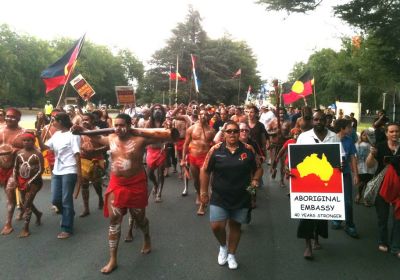
-
 About 40 people crowded into the Brisbane Activist Centre on February 7 for a Green Left Weekly public forum titled “The truth about the Aboriginal Tent Embassy”, presented by prominent Murri leader and Socialist Alliance Aboriginal affairs spokesperson Sam Watson. Watson was an activist at the Tent Embassy in Canberra in 1972, and attended the Embassy 40th anniversary commemoration over January 26-28.
About 40 people crowded into the Brisbane Activist Centre on February 7 for a Green Left Weekly public forum titled “The truth about the Aboriginal Tent Embassy”, presented by prominent Murri leader and Socialist Alliance Aboriginal affairs spokesperson Sam Watson. Watson was an activist at the Tent Embassy in Canberra in 1972, and attended the Embassy 40th anniversary commemoration over January 26-28. -
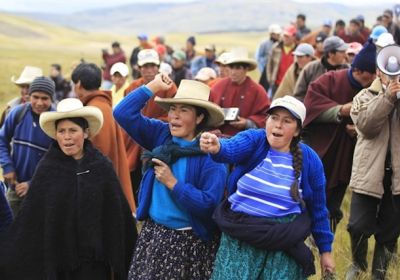 Cajamarca, a town with tragic associations in Peruvian history, is the setting of another devastating imperialist onslaught. In 1532, a band of Spanish conquistadores ambushed the Inca king Atahualpa in the central plaza of this Andean town. The brutal spirit of conquista is alive and well in contemporary Cajamarca, in the form of the US-based Newmont mining corporation, an outfit with a slick PR machine and a very dirty environmental and human rights track record.
Cajamarca, a town with tragic associations in Peruvian history, is the setting of another devastating imperialist onslaught. In 1532, a band of Spanish conquistadores ambushed the Inca king Atahualpa in the central plaza of this Andean town. The brutal spirit of conquista is alive and well in contemporary Cajamarca, in the form of the US-based Newmont mining corporation, an outfit with a slick PR machine and a very dirty environmental and human rights track record. -
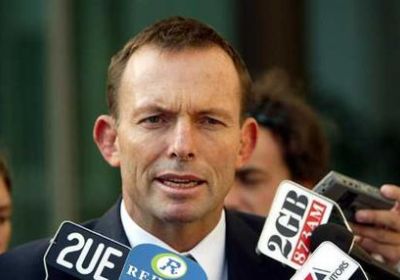 Well, it is only February and one thing is certain: a federal election doesn’t have to be called until as late as November 2013, but the Tony Abbott-led Coalition smells blood and, as far as they are concerned, they are in election mode. This means if you are dark-skinned, downtrodden or desperate, you had better look out. You are right in the Coalition’s firing line, and just behind them is a desperate Labor government (led, for now, by Julia Gillard) eager to play the futile game of blunting attacks from the right by joining in.
Well, it is only February and one thing is certain: a federal election doesn’t have to be called until as late as November 2013, but the Tony Abbott-led Coalition smells blood and, as far as they are concerned, they are in election mode. This means if you are dark-skinned, downtrodden or desperate, you had better look out. You are right in the Coalition’s firing line, and just behind them is a desperate Labor government (led, for now, by Julia Gillard) eager to play the futile game of blunting attacks from the right by joining in. -
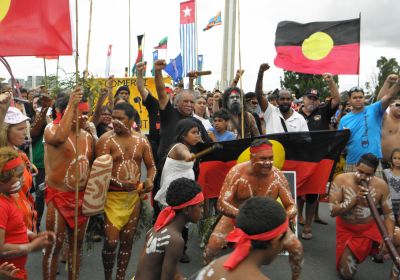 In the week after the January 26 Aboriginal Tent Embassy anniversary celebrations and protests, the mainstream media poured out a continuous stream of negative, scathing commentary on the Tent Embassy and the people that defended it. Ignoring the thousands of people gathered for three days to recognise the achievements of the Tent Embassy and protest against ongoing attacks to Aboriginal people today, the corporate media ran stories of an “angry mob” that surrounded a Canberra restaurant and “besieged” Prime Minister Julia Gillard and Liberal leader Tony Abbott.
In the week after the January 26 Aboriginal Tent Embassy anniversary celebrations and protests, the mainstream media poured out a continuous stream of negative, scathing commentary on the Tent Embassy and the people that defended it. Ignoring the thousands of people gathered for three days to recognise the achievements of the Tent Embassy and protest against ongoing attacks to Aboriginal people today, the corporate media ran stories of an “angry mob” that surrounded a Canberra restaurant and “besieged” Prime Minister Julia Gillard and Liberal leader Tony Abbott. -
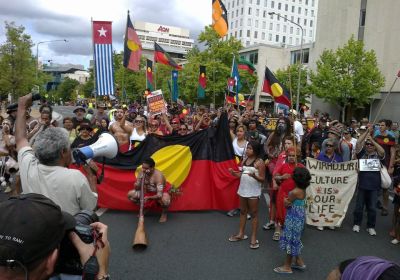 Truth and accuracy have never been the highest priorities for the mainstream media. But hysteria and misrepresentation of the Aboriginal Tent Embassy protest in Canberra on January 26 have been taken to an absurd level. Terms like “mob violence”, “thuggery” and “riot” have been used by journalists and politicians to describe a protest where no one was injured, no property was damaged and no one was arrested.
Truth and accuracy have never been the highest priorities for the mainstream media. But hysteria and misrepresentation of the Aboriginal Tent Embassy protest in Canberra on January 26 have been taken to an absurd level. Terms like “mob violence”, “thuggery” and “riot” have been used by journalists and politicians to describe a protest where no one was injured, no property was damaged and no one was arrested. -
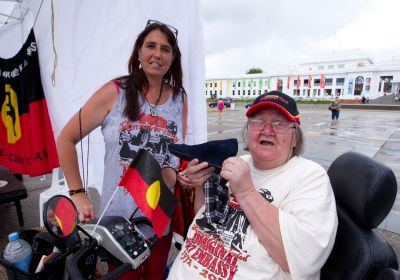
Pat Eatock, a veteran of the 1972 Aboriginal Tent Embassy, was recently splashed all over the news holding the Prime Minister's shoe. The shoe was lost when Julia Gillard was clumsily evacuated with opposition leader Tony Abbott by her panicked security detail from a function just 100 metres from the 40th anniversary gathering at the Aboriginal Tent Embassy. The gathering took place next to the Old Parliament House in Canberra on January 26.
-
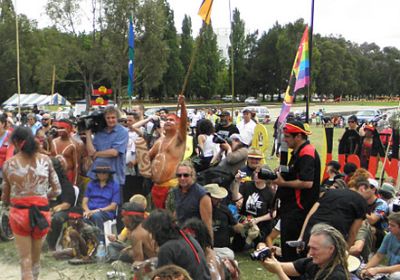 Political establishment and mass media ill will towards the Aboriginal Tent Embassy should not confuse us. The real and valid question is still the past, present and future of Aboriginal Australians.
Political establishment and mass media ill will towards the Aboriginal Tent Embassy should not confuse us. The real and valid question is still the past, present and future of Aboriginal Australians. -
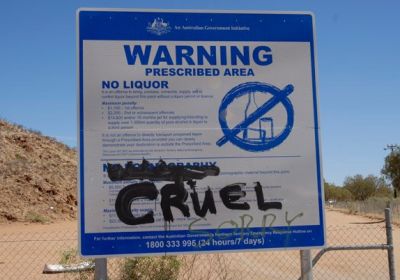 The Stop the Intervention Collective Sydney released the statement below on January 31. * * * The Stop the Intervention Collective Sydney (STICS) has declared support for the Aboriginal rights protests in Canberra on January 26 targeting Tony Abbott and Julia Gillard. STICS says that the Northern Territory intervention has turned the clock back more than 40 years in Aboriginal affairs, erasing many of the gains made through the struggles of the original Tent Embassy.
The Stop the Intervention Collective Sydney released the statement below on January 31. * * * The Stop the Intervention Collective Sydney (STICS) has declared support for the Aboriginal rights protests in Canberra on January 26 targeting Tony Abbott and Julia Gillard. STICS says that the Northern Territory intervention has turned the clock back more than 40 years in Aboriginal affairs, erasing many of the gains made through the struggles of the original Tent Embassy. -
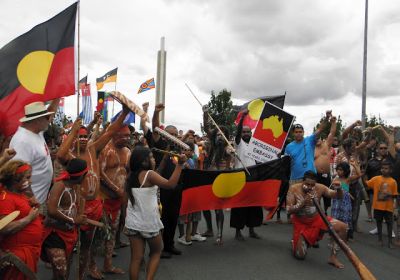 Moments before Julia Gillard was whisked away from the angry crowd, losing her shoe in the process, she began an awards ceremony speech with these words: “Can I start by acknowledging the traditional owners of the land on which we meet and in the spirit of reconciliation pay my respects to elders past and present.” It was an expression she had used many times before, like an eastern mantra. A brief check of her press website shows she had said these exact words on 19 and 20 January 2012, 18 November 2011, 21 and 4 October 2011, and 1 Jan 2011.
Moments before Julia Gillard was whisked away from the angry crowd, losing her shoe in the process, she began an awards ceremony speech with these words: “Can I start by acknowledging the traditional owners of the land on which we meet and in the spirit of reconciliation pay my respects to elders past and present.” It was an expression she had used many times before, like an eastern mantra. A brief check of her press website shows she had said these exact words on 19 and 20 January 2012, 18 November 2011, 21 and 4 October 2011, and 1 Jan 2011. -
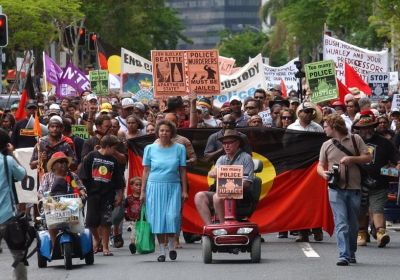
he director of a documentary about the death in custody of Aboriginal man Mulrunji Doomadgee says the family wanted him to use footage of the death, but he was blocked from accessing it..
-
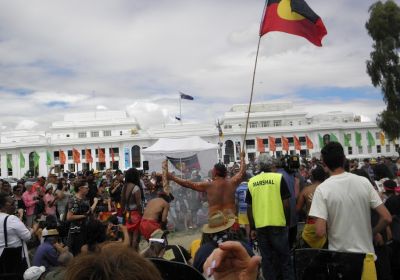
Opposition leader Tony Abbott and his co-thinkers are dead wrong. The Aboriginal Tent Embassy, established by activists 40 years ago, is as relevant as it was then. Early on January 26, Abbott told reporters he understood why the embassy was set up “all those years ago”, but said it was not relevant today.
-
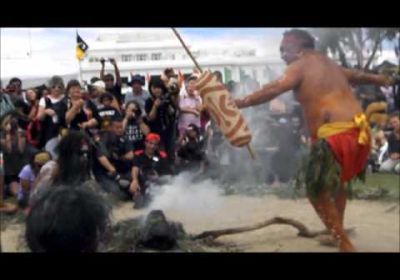
The real story of the powerful march celebrating the 40th anniversary of the Aboriginal Tent Embassy was ignored by the mainstream media in favour of misleading and charged accounts of a confrontation of Australia's racist opposition leader Tony Abbott and PM Julia Gillard by protesters later in the day.